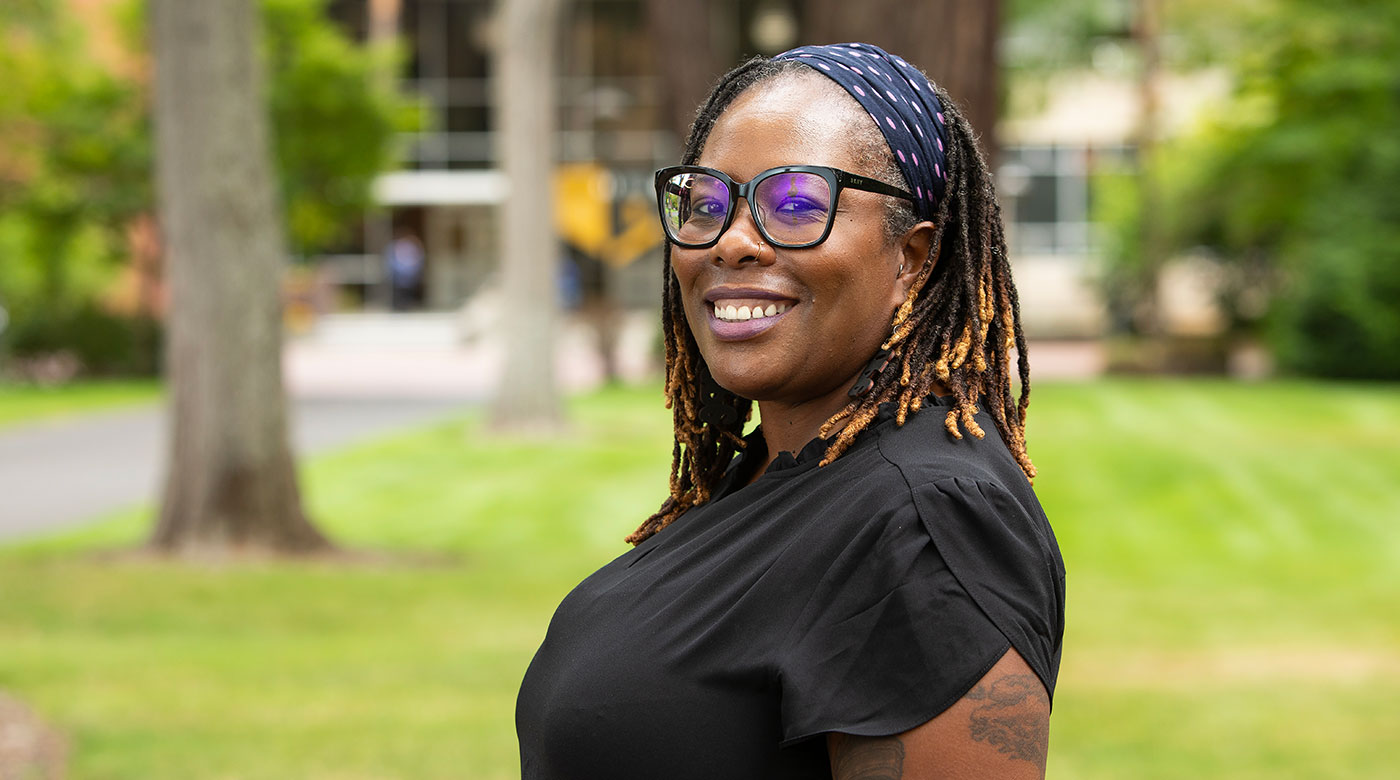Humanization is Vocation: Angie Hambrick discusses student well-being, interdependence and retention

By Zach Powers '10, MFA '24
Resolute Editor
Angie Hambrick still identifies as a Midwest girl, but after working at PLU for 18 years, she’s also a Lute through and through. As the associate vice president for diversity, justice and sustainability, Hambrick provides strategic vision on matters related to equity and inclusion and leads initiatives that enrich the university’s efforts to become a more socially just and sustainable living, learning and working community.
Throughout her PLU tenure, Hambrick has frequently been selected by PLU’s last three presidents to serve on leadership committees that delve into the most urgent and complex challenges facing the university. Last year President Belton appointed her to co-chair the newly reconstituted Retention and Progression Advisory Group (RPAG), a working committee focused on improving the retention rate of Black and Latinx students.
Retention rate refers to the percentage of first-time undergraduate students who progress from their first fall term to their second fall term. It’s a consistent indicator of how many students will progress to graduation. RPAG is part of a university-wide effort to improve PLU’s progression and retention rates.
We visited Hambrick in her office at the Center for Diversity, Justice and Sustainability to discuss her work.
Has your philosophy or approach to the work of diversity, equity and inclusion at PLU changed much throughout the 18 years you’ve been part of the campus community?
The core of who I am in this work has not changed. I have a tattoo that is a quote from educator and philosopher Paulo Freire. It says “Humanization is vocation.” That’s always been my foundation. My vocation is to make sure that the conditions exist where all people can feel fully human in whatever that means to them. That was my focus on day one when I was hired to manage the diversity center, and that is my focus now, all these years later, as an AVP. The core of what I do and why I do it has not changed.
What’s the first word that comes to mind when you think of well-being?
That probably depends on the day, but today I’ll say interdependence.
Great word! How does it connect with well-being?
My well-being has a lot to do with the people around me and the people I care for, and whether they are well. I think someone’s well-being is in relationship with and interdependent with the well-being of those around them and also with their environment.
How have you approached your recent efforts to help retention at PLU?
I think of retention work as harm reduction. It’s thinking about how I can create, co-create, or positively influence policy changes and new efforts that will mitigate harm, particularly for kids of color. We’ve got to do less harm. Especially to Black, Latinx and other groups for whom PLU — and higher education across the country — was not designed. It’s no surprise that these groups retain at a lower rate than their peers. Universities were intentionally designed to keep these folks out. Now we’ve let them in, but that alone isn’t nearly enough. Institutions need to rethink, and in a lot of cases completely reconstruct, our systems and structures to equitably serve all of the students we’re recruiting.
What do you mean by doing harm?
When students come here and leave with debt and without degrees, that’s harmful and unethical. That’s why I think a big part of my job — and why I’m currently totally invested in retention work — is doing everything I can to ensure that our practices at PLU match my ethics.
What's surprised you as you've been researching retention policy and practice?
That the thinking in higher education, especially regarding minoritized students, hasn’t changed in years. In many places, it’s still all about what a student doesn’t have, what a student lacks. The standard thinking is that the environment that a student has come from is the reason why they now can’t successfully do X, Y and Z at their university. But a growing number of us understand that this is deficit-minded thinking that serves no one, least of all our students.
What would be the antithesis of a deficit-minded mindset? Equity-minded?
Yes, exactly. When it comes to retention, specifically, deficit-minded thinking solely imposes the responsibility for a student’s success on the student, not the institution. Equity-minded thinking examines the institutional structures that are in place and questions if they are putting students in the best possible position to be successful.
What’s an example of a new retention-focused program at PLU that you’re encouraged by?
We have a new program called Knack that is strengthening our peer learning community on campus by matching students in need of support in a particular class with peer tutors who have already earned good grades in that same class.
What sets Knack apart from the existing tutoring services?
Coverage, scale and flexibility. Almost every undergrad class offered last semester had a Knack tutor signed up and ready to work with students enrolled in that class. This is the first time tutoring has been available for several departments. It also allows students and their peer tutors to schedule virtual or in-person sessions at times that work for them. It’s like Uber for academic assistance and tutoring.
Could you recommend a book or article for folks who are interested in diving a little deeper into these big topics we’ve discussed?
Of course. I’ll give you one book and one article. The book is “A Third University is Possible” by la paperson. It challenges us to imagine a radically different structure for higher education. The article is “Twisted at the Roots” by D-L Stewart. It explores why inequalities persist across higher education and first steps toward transformation. Both are really cool reads.


